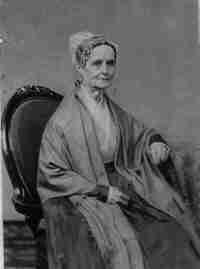 Lucretia Coffin Mott Lucretia Coffin Mottabolitionist and advocate for women's
rights
Lucretia Coffin was born in
Nantucket, Massachusetts,
on January 3, 1793, into a family of Quakers. She
was educated at Nine Partners, a Quaker boarding
school near Poughkeepsie, New York, and taught
there in 1808 and 1809. She moved to Philadelphia
in 1809. In 1811, she married James Mott, who had
been a teacher at Nine Partners.
Mott became prominent in the
Society of Friends after 1817, and became a
minister of the Society in 1821. Like most other
Quakers of her day, she was active in the
abolitionist movement. She became known for her
eloquent speeches against slavery, and in 1833
she helped found the American Anti-Slavery
Society and the Philadelphia Female Anti-Slavery
Society. She helped organize the Anti-Slavery
Convention of American Women in 1837.
In 1840, Mott and her husband
went to London as delegates to the World
Anti-Slavery Convention. However, the men who
controlled the convention refused to seat her and
the other women delegates. One of the other women
who was denied a seat was Elizabeth Cady Stanton, and the two women pledged then and
there to work for women's rights.
In 1848, Mott and Stanton
organized a women's rights convention in Seneca
Falls, New York, the
first convention of its kind ever held in
America. Attended by both women and men, the
convention delegates passed a "Declaration
of Sentiments" which demanded more rights
for women, including better educational and job
opportunities and the right to vote.
After 1848, Mott began to speak
widely for both abolition and women's rights.
After the passage of the Fugitive Slave Act in
1850, the Motts made their home a station on the
Underground Railroad. After slavery was abolished
in 1865, she supported the movement to give
blacks the right to vote. She also wrote a book, Discourse
on Women (1850), which discussed the
economic, educational, and political restrictions
on women in the United States and other Western
nations.
In 1864, the Motts and other
Quakers founded Swarthmore College.
Mott spent the remainder of her
life attending meetings and conventions on
women's rights, temperance, and the establishment
of universal peace.
Lucretia Coffin Mott died at
Roadside, her country home north of Philadelphia,
on November 11, 1880.

Massachusetts
Elizabeth Cady Stanton
Seneca
Falls Convention
Questions or comments about
this page?
|



